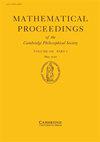随机分形及其与获胜集的交集
IF 0.8
3区 数学
Q3 MATHEMATICS
Mathematical Proceedings of the Cambridge Philosophical Society
Pub Date : 2021-07-07
DOI:10.1017/S0305004121000360
引用次数: 2
摘要
我们证明了$\mathbb{R}^{d}$中的分形渗集几乎肯定地与每一个具有满Hausdorff维数的超平面绝对胜利集相交。特别是,如果$E\subset\mathbb{R}^{d}$是一个分形渗透过程的实现,那么几乎可以肯定(以$E\neq\emptyset$为条件),对于$\mathbb{R}^{d}$, $\dim_{H}\left(E\cap\left(\bigcap_{i\in\mathbb{N}}f_{i}\left(\text{BA}_{d}\right)\right)\right)=\dim_{H}\left(E\right)$的$C^{1}$的微分同态的每个可数集合$\left(f_{i}\right)_{i\in\mathbb{N}}$,其中$\text{BA}_{d}$是$\mathbb{R}^{d}$中严重近似向量的集合。我们通过证明E几乎肯定包含维度任意接近$\dim_{H}\left(E\right)$的超平面漫射子集来证明这一点。我们通过分析高尔顿-沃森树来实现这一点,并表明它们几乎肯定包含适当的子树,其投影到$\mathbb{R}^{d}$产生上述e的子集。这种方法允许我们通过将高尔顿-沃森树投影到任何吸引子不包含在单个仿射超平面中的相似IFS来获得更一般的结果。因此,我们的一般结果涉及到比分形渗透更广泛的随机分形类。本文章由计算机程序翻译,如有差异,请以英文原文为准。
Random fractals and their intersection with winning sets
We show that fractal percolation sets in
$\mathbb{R}^{d}$
almost surely intersect every hyperplane absolutely winning (HAW) set with full Hausdorff dimension. In particular, if
$E\subset\mathbb{R}^{d}$
is a realisation of a fractal percolation process, then almost surely (conditioned on
$E\neq\emptyset$
), for every countable collection
$\left(f_{i}\right)_{i\in\mathbb{N}}$
of
$C^{1}$
diffeomorphisms of
$\mathbb{R}^{d}$
,
$\dim_{H}\left(E\cap\left(\bigcap_{i\in\mathbb{N}}f_{i}\left(\text{BA}_{d}\right)\right)\right)=\dim_{H}\left(E\right)$
, where
$\text{BA}_{d}$
is the set of badly approximable vectors in
$\mathbb{R}^{d}$
. We show this by proving that E almost surely contains hyperplane diffuse subsets which are Ahlfors-regular with dimensions arbitrarily close to
$\dim_{H}\left(E\right)$
.
We achieve this by analysing Galton–Watson trees and showing that they almost surely contain appropriate subtrees whose projections to
$\mathbb{R}^{d}$
yield the aforementioned subsets of E. This method allows us to obtain a more general result by projecting the Galton–Watson trees against any similarity IFS whose attractor is not contained in a single affine hyperplane. Thus our general result relates to a broader class of random fractals than fractal percolation.
求助全文
通过发布文献求助,成功后即可免费获取论文全文。
去求助
来源期刊
CiteScore
1.70
自引率
0.00%
发文量
39
审稿时长
6-12 weeks
期刊介绍:
Papers which advance knowledge of mathematics, either pure or applied, will be considered by the Editorial Committee. The work must be original and not submitted to another journal.

 求助内容:
求助内容: 应助结果提醒方式:
应助结果提醒方式:


